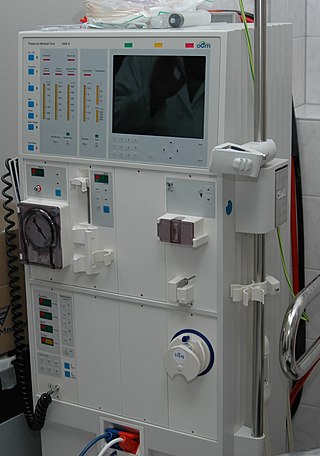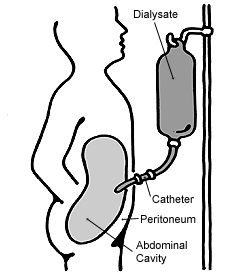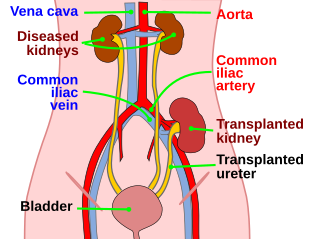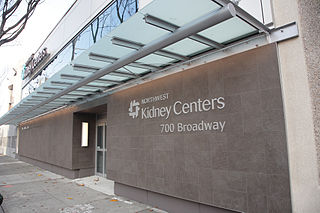Nephrology is a specialty for both adult internal medicine and pediatric medicine that concerns the study of the kidneys, specifically normal kidney function and kidney disease, the preservation of kidney health, and the treatment of kidney disease, from diet and medication to renal replacement therapy. The word "renal" is an adjective meaning "relating to the kidneys", and its roots are French or late Latin. Whereas according to some opinions, "renal" and "nephro" should be replaced with "kidney" in scientific writings such as "kidney medicine" or "kidney replacement therapy", other experts have advocated preserving the use of renal and nephro as appropriate including in "nephrology" and "renal replacement therapy", respectively.

Kidney dialysis is the process of removing excess water, solutes, and toxins from the blood in people whose kidneys can no longer perform these functions naturally. Along with kidney transplantation, it is a type of renal replacement therapy.

Kidney failure, also known as renal failure or end-stage renal disease (ESRD), is a medical condition in which the kidneys can no longer adequately filter waste products from the blood, functioning at less than 15% of normal levels. Kidney failure is classified as either acute kidney failure, which develops rapidly and may resolve; and chronic kidney failure, which develops slowly and can often be irreversible. Symptoms may include leg swelling, feeling tired, vomiting, loss of appetite, and confusion. Complications of acute and chronic failure include uremia, hyperkalemia, and volume overload. Complications of chronic failure also include heart disease, high blood pressure, and anaemia.

Kidney disease, or renal disease, technically referred to as nephropathy, is damage to or disease of a kidney. Nephritis is an inflammatory kidney disease and has several types according to the location of the inflammation. Inflammation can be diagnosed by blood tests. Nephrosis is non-inflammatory kidney disease. Nephritis and nephrosis can give rise to nephritic syndrome and nephrotic syndrome respectively. Kidney disease usually causes a loss of kidney function to some degree and can result in kidney failure, the complete loss of kidney function. Kidney failure is known as the end-stage of kidney disease, where dialysis or a kidney transplant is the only treatment option.

Acute kidney injury (AKI), previously called acute renal failure (ARF), is a sudden decrease in kidney function that develops within seven days, as shown by an increase in serum creatinine or a decrease in urine output, or both.

Chronic kidney disease (CKD) is a type of long-term kidney disease, in which either there is a gradual loss of kidney function which occurs over a period of months to years, or an abnormal kidney structure. Initially, patients are usually asymptomatic, but later symptoms may include leg swelling, feeling tired, vomiting, loss of appetite, and confusion. Complications can relate to hormonal dysfunction of the kidneys and include high blood pressure, bone disease, and anemia. Additionally CKD patients have markedly increased cardiovascular complications with increased risks of death and hospitalization. CKD can lead to end-stage kidney failure requiring kidney dialysis or kidney transplantation.

Peritoneal dialysis (PD) is a type of dialysis that uses the peritoneum in a person's abdomen as the membrane through which fluid and dissolved substances are exchanged with the blood. It is used to remove excess fluid, correct electrolyte problems, and remove toxins in those with kidney failure. Peritoneal dialysis has better outcomes than hemodialysis during the first two years. Other benefits include greater flexibility and better tolerability in those with significant heart disease.

Kidney transplant or renal transplant is the organ transplant of a kidney into a patient with end-stage kidney disease (ESRD). Kidney transplant is typically classified as deceased-donor or living-donor transplantation depending on the source of the donor organ. Living-donor kidney transplants are further characterized as genetically related (living-related) or non-related (living-unrelated) transplants, depending on whether a biological relationship exists between the donor and recipient. The first successful kidney transplant was performed in 1954 by a team including Joseph Murray, the recipient's surgeon, and Hartwell Harrison, surgeon for the donor. Murray was awarded a Nobel Prize in Physiology or Medicine in 1990 for this and other work. In 2018, an estimated 95,479 kidney transplants were performed worldwide, 36% of which came from living donors.

Home hemodialysis (HHD) is the provision of hemodialysis to purify the blood of a person whose kidneys are not working normally, in their own home. One advantage to doing dialysis at home is that it can be done more frequently and slowly, which reduces the "washed out" feeling and other symptoms caused by rapid ultrafiltration, and it can often be done at night, while the person is sleeping.

Artificial kidney is often a synonym for hemodialyzer, but may also refer to the other renal replacement therapies that are in use and/or in development. This article deals mainly with bio-artificial kidneys featuring cells that are grown from renal cell lines/renal tissue.
Renal replacement therapy (RRT) is therapy that replaces the normal blood-filtering function of the kidneys. It is used when the kidneys are not working well, which is called kidney failure and includes acute kidney injury and chronic kidney disease. Renal replacement therapy includes dialysis, hemofiltration, and hemodiafiltration, which are various ways of filtration of blood with or without machines. Renal replacement therapy also includes kidney transplantation, which is the ultimate form of replacement in that the old kidney is replaced by a donor kidney.
The National Kidney Foundation, Inc. (NKF) is a voluntary nonprofit health organization in the United States, headquartered in New York City, with over 30 local offices across the country. Its mission is to prevent kidney and urinary tract diseases, improve the health and well-being of individuals and families affected by these diseases, and increase the availability of all organs for transplantation. NKF is the largest, most comprehensive, and longstanding patient-centric organization dedicated to the awareness, preventions and treatments of kidney disease in the United States.
The American Kidney Fund (AKF) is a publicly supported non-profit organization founded in 1971.

Northwest Kidney Centers is a regional, not-for-profit community-based provider of kidney dialysis, public health education, and research into the causes and treatments of chronic kidney disease. Established in Seattle in 1962, it was the world's first out-of-hospital dialysis provider. It offers dialysis throughout the greater Seattle area in 20 free-standing clinics, eight hospitals and its home dialysis program. It opened its first clinic in Everett in 2020, the organization's first in Snohomish county.

Robert Provenzano is an American nephrologist. He is also an Associate Clinical Professor of Medicine at Wayne State University School of Medicine.
Dialysis Clinic, Inc. is a nonprofit medical corporation founded in 1971 and chartered as a 501(c)(3) tax-exempt organization under IRS regulations.
Kamyar Kalantar-Zadeh is a US American physician doing research in nephrology, kidney dialysis, nutrition, and epidemiology. He is best known as a specialist in kidney disease nutrition and chronic kidney disease and for his hypothesis about the longevity of individuals with chronic disease states, also known as reverse epidemiology including obesity paradox. According to this hypothesis, obesity or hypercholesterolemia may counterintuitively be protective and associated with greater survival in certain groups of people, such as elderly individuals, dialysis patients, or those with chronic disease states and wasting syndrome (cachexia), whereas normal to low body mass index or normal values of serum cholesterol may be detrimental and associated with worse mortality. Kalantar-Zadeh is also known for his expertise in kidney dialysis therapy, including incremental dialysis, as well as renal nutrition. He is the brother of Kourosh Kalantar-zadeh, who is an Australian scientist involved in research in the fields of materials sciences, nanotechnology, and transducers.
Symptom targeted intervention (STI) is a clinical program being used in medical settings to help patients who struggle with symptoms of depression or anxiety or adherence to treatment plans but who are not interested in receiving outpatient mental health treatment. STI is an individualized therapeutic model and clinical program that teaches patients brief, effective ways to cope with difficult thoughts, feelings, and behaviors using evidence-based interventions. Its individualized engagement process employs techniques from solution-focused therapy, using a Rogerian, patient-centered philosophy. This engagement process ensures that even challenging, at-risk, and non-adherent patients are able to participate.
A liver support system or diachysis is a type of therapeutic device to assist in performing the functions of the liver. Such systems focus either on removing the accumulating toxins, or providing additional replacement of the metabolic functions of the liver through the inclusion of hepatocytes to the device. A diachysis machine is used for acute care i.e. emergency care, as opposed to a dialysis machine which are typically used over the longer term. These systems are being trialed to help people with acute liver failure (ALF) or acute-on-chronic liver failure.
Onconephrology is a specialty in nephrology that deals with the study of kidney diseases in cancer patients. A nephrologist who takes care of patients with cancer and kidney disease is called an onconephrologist. This branch of nephrology encompasses nephrotoxicity associated with existing and novel chemotherapeutics, kidney disease as it pertains to stem cell transplant, paraneoplastic kidney disorders, paraproteinemias, electrolyte disorders associated with cancer, and more as discussed below.










